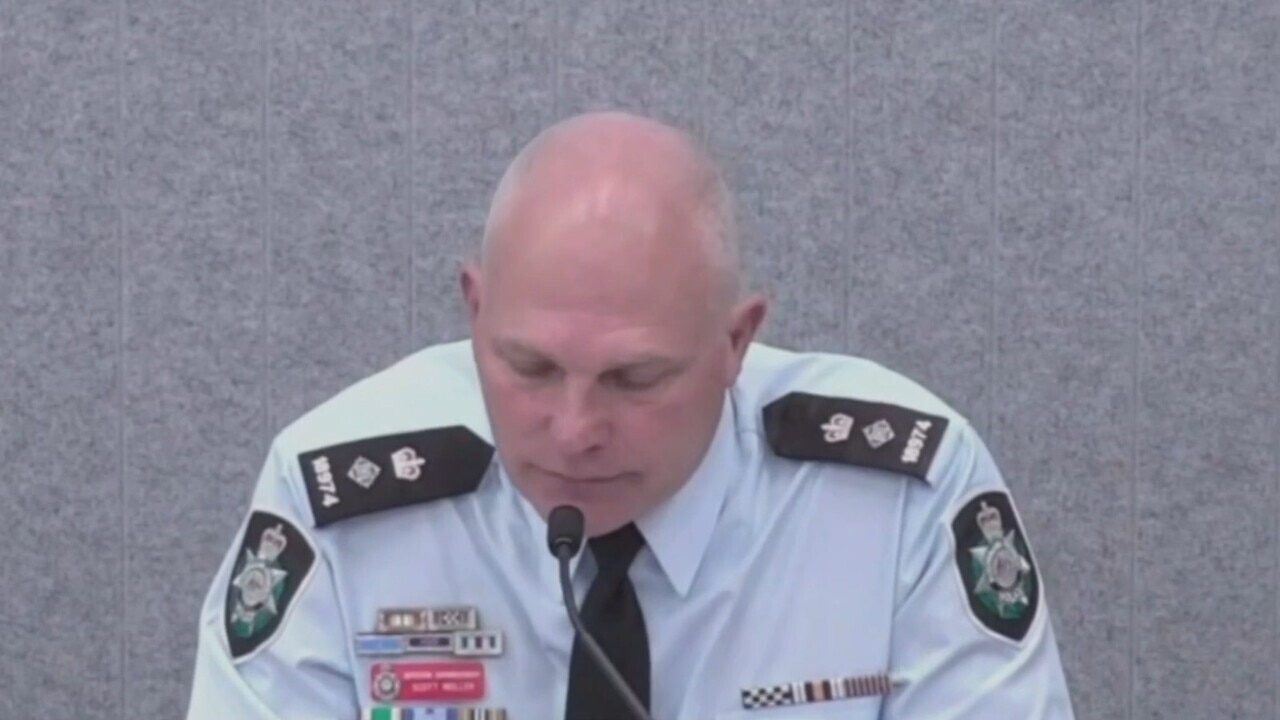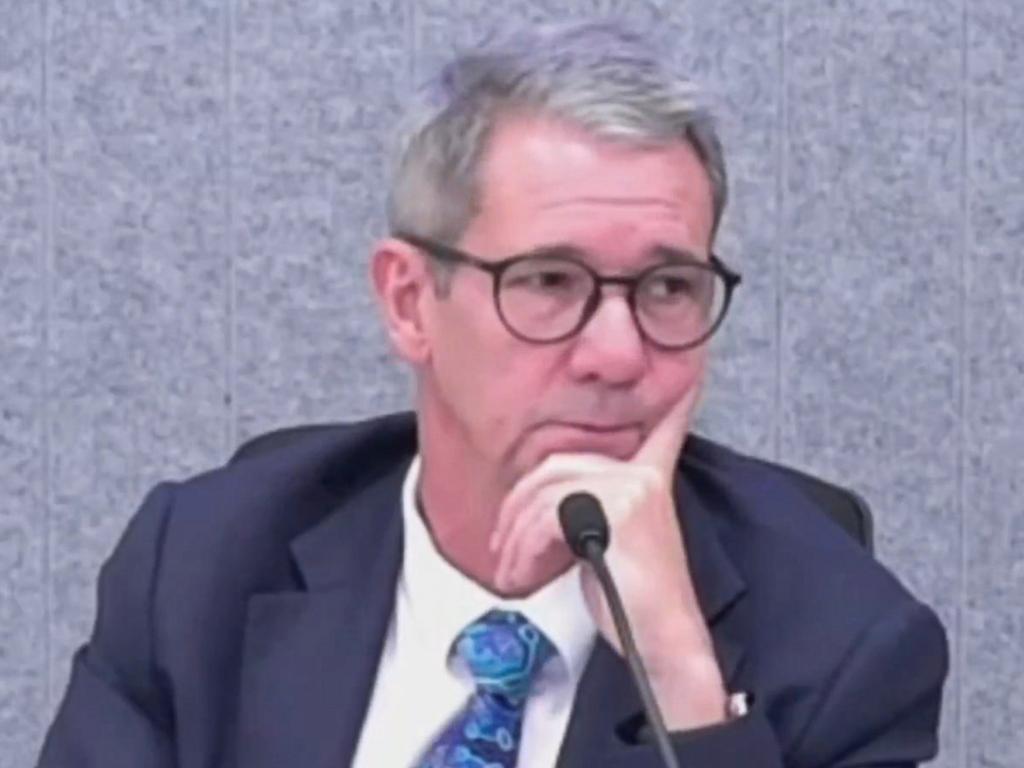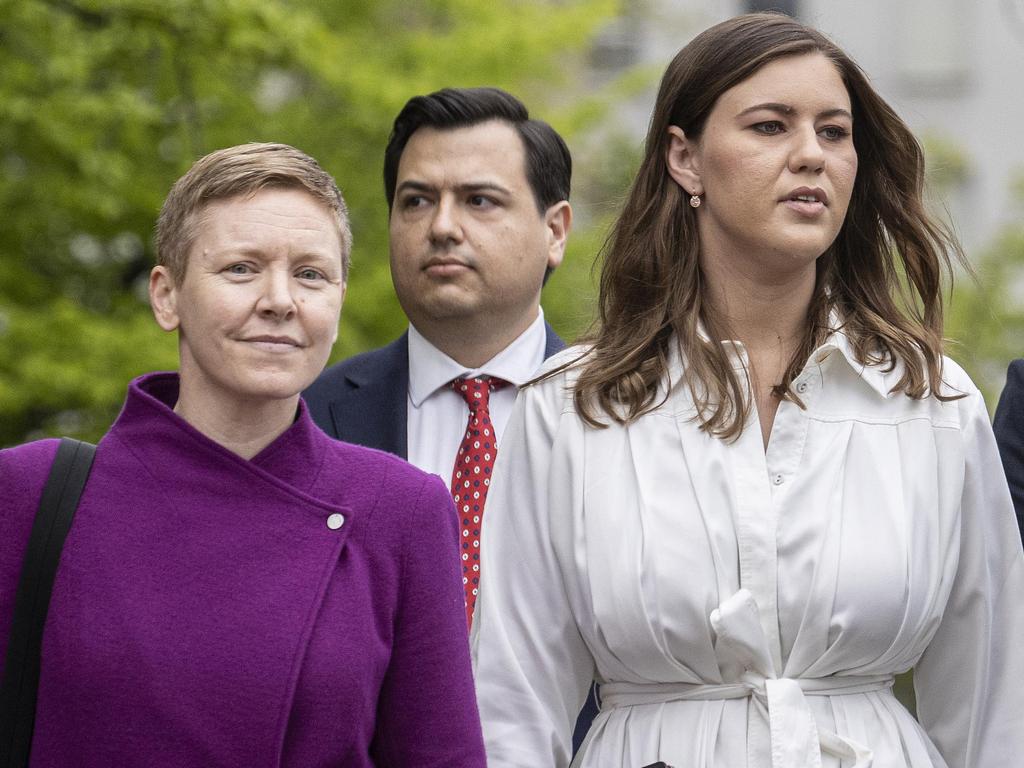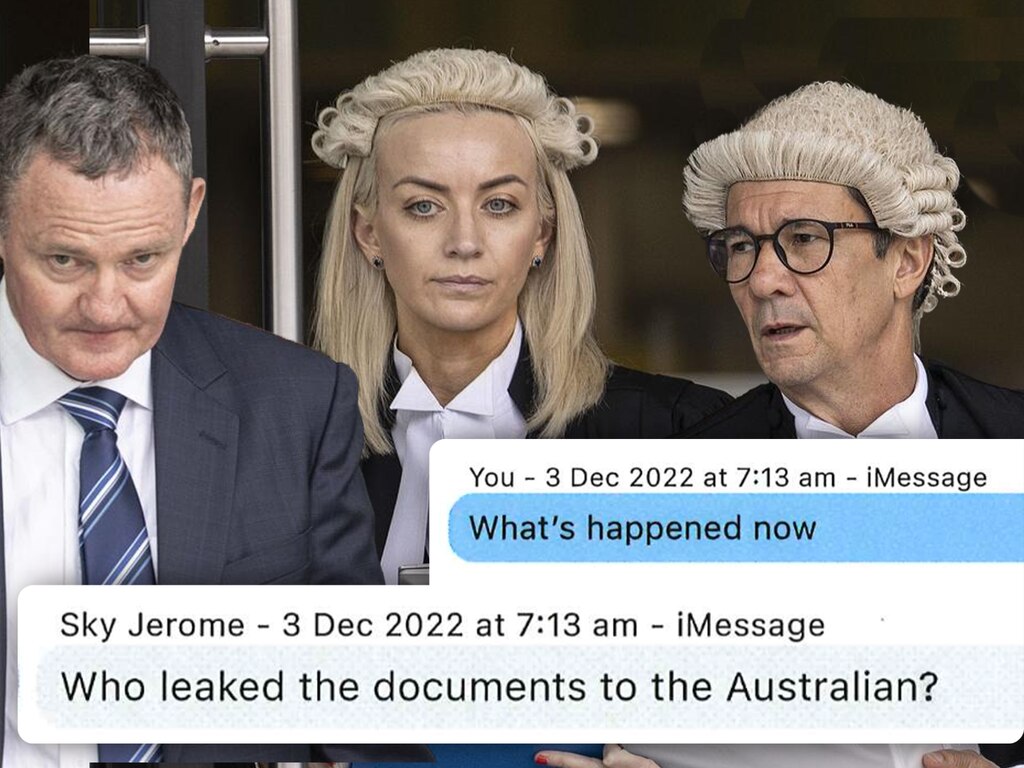Police ‘acted hour after boyfriend’s call’
The police officer in charge of the investigation into Brittany Higgins’s rape allegations has revealed the immense pressure investigators were under to charge Bruce Lehrmann.

The police officer in charge of the investigation into Brittany Higgins’s rape allegations has revealed the immense pressure investigators were under to charge Bruce Lehrmann, culminating in a direct phone call from her boyfriend, David Sharaz, to a senior detective threatening to publicly condemn the time being taken.
Detective Superintendent Scott Moller gave evidence to the Sofronoff inquiry on Monday that within an hour of Mr Sharaz calling Detective Inspector Marcus Boorman, he was given instructions to serve a summons on Mr Lehrmann for one count of sexual intercourse without consent.
Superintendent Moller agreed that at the time the decision was made by his boss, Commander Michael Chew, investigators were faced with “the potential threat of Ms Higgins going public about the delay”.
Detectives were under so much pressure to progress the case against their professional beliefs that many went on stress leave, Superintendent Moller said.
He confirmed that as The Australian reported last year, police did not believe there was enough evidence to charge Mr Lehrmann but agreed to do so after receiving advice from ACT Director of Public Prosecutions Shane Drumgold.

Superintendent Moller said his investigators did not believe they had met the evidentiary threshold to charge Mr Lehrmann so he signed the summons himself.
“I swore the summons because I did not want to put any of my staff in the position where they had to do something they didn’t want to do, didn’t believe in, so I did it,” he said.
“I didn’t think there was enough evidence and then I received the director’s advice and certainly from his advice, I decided to go ahead.”
Superintendent Moller also revealed Ms Higgins was allowed to watch CCTV footage of herself and Mr Lehrmann at Parliament House because she was “so keen to see it” - even though it could have corrupted her evidence - as police felt obliged under their “victim-centric” approach to show it to her.
Superintendent Moller said Ms Higgins “continually asked” to see the footage, which showed the pair exiting and entering Parliament House on the night Ms Higgins claims Mr Lehrmann raped her on a sofa in senator Linda Reynolds’s office.
“In a normal investigation, we would never show somebody evidence like that because it might influence their evidence later in court,” he said.
Superintendent Moller agreed to a suggestion by counsel assisting, Joshua Jones, that Ms Higgins had expressed to police that “her memory had been corrupted” by speaking with journalists.

“Wearing our investigators’ hats, we go: ‘No, we should not show that evidence because it might taint it later on down the track’. But under a victim-centric model, we go ‘Well, this is really important for her to see this, we’re trying to support her’.”
Mr Jones: “Ms Higgins had expressed on a number of occasions that she’d had a lot to drink and had blacked out and by showing her that video footage, you risked corrupting her evidence about that section of the night?”
Superintendent Moller: “Yes, and that was the dilemma that we had, to be honest. That was the issue that we had but it was so important for supporting the victim, she was so keen to see that and to help her healing process that it was important to show her.”

On June 28, 2021, the DPP provided advice to ACT Policing that there was sufficient evidence to charge Mr Lehrmann but before making their final decision, police sought to have their investigation reviewed by officers who were not involved in the matter.
Before the review could occur, an article was published on news.com.au on July 29, 2021, in which Mr Drumgold denied his office was delaying the case after AFP Police Commissioner Reece Kershaw wrongly indicated during a National Press Club address the matter was still with the DPP.
Mr Drumgold told the website he had provided his advice on whether charges should be laid a month earlier and any decision on whether to arrest and charge Mr Lehrmann lay with the police.
The day that the article was published, Mr Sharaz emailed Victims of Crime Commissioner Heidi Yates to ask “What’s going on? We’re reading this news about it. Is a decision going to be made as was forecast in the July 12 meeting?”
Police had previously told Ms Higgins that they expected a decision would be made by the end of July.
On July 30, Ms Yates forwarded the email from Mr Sharaz to Inspector Boorman who informed Superintendent Moller of the email. A short time later, Mr Sharaz called Inspector Boorman and indicated that Ms Higgins planned to release a media statement critical of how long police were taking to charge Mr Lehrmann.
“9.30am further briefing with Inspector Boorman re Higgins,” Superintendent Moller recorded in his police diary at the time.
“Discussion re Higgins contemplating media release due to recent media statements by Commissioner AFP and DPP.”
Superintendent Moller then informed Commander Chew about Ms Higgins’s possible media statement.

“Travel to Brisbane next week to talk with Higgins and serve summons on Lehrmann for one count of sexual intercourse without consent,” Superintendent Moller wrote in his diary of his instructions from Commander Chew. “Chew further said start preparing the summons now in preparation for your travel based on legal provided by DPP.” Mr Jones put it to Superintendent Moller that when police made the decision to serve the summons, they were dealing with negative press, the threat of Ms Higgins going public about the further delay and incorrect public comments by their commissioner.
“In the office, around the time of charging, there was immense pressure,” Mr Jones suggested.
“Yes, well throughout the whole part of the investigation, but yes, it culminated at this time,” Superintendent Moller replied.
Mr Jones: “And here, the commander on the 30th is directing to get the summons served?”
Superintendent Moller: “Well, he says preparations for the summons to be served, yes.”
Mr Jones: “But he’s saying to you, isn’t he? ‘Get the summons ready, go up to Brisbane’ … and he is making the decision to charge in light of the pressure that’s on him?”
Superintendant Moller: “No, I think that’s a little bit unfair – he’s making the decision to charge based on, you know, the brief evidence that has been provided.”
In other evidence, Superintendant Moller said he believed it was necessary for police to conduct a second interview with Ms Higgins in May 2021 to clarify inconsistencies they had discovered during their investigation.

“We had a lot of concern about the evidence being presented to us and we wanted to clarify some of the inconsistencies we’d developed through the evidence,” he said. “We’re torn by trying to get the best possible evidence we can, but also we’re trying to support the complainant through this process.
“We’ve got to support and protect the (alleged) victim but we’ve also got an obligation to collect the … most thorough evidence we can to put before the courts.”
Superintendent Moller also conceded that Ms Higgins’s confidential counselling notes were wrongly provided to Mr Lehrmann’s previous lawyer but said ordinary processes had been circumvented “because there was a need to get it all done”, following instructions from Commander Chew.
“I was aware, I was living the pressures at the time,” he said.
“I knew the exceptional amount of pressure on us to get this done and I knew the pressure that was on him as well so he didn’t have to explain it to me.
“If you were involved in that environment at that time, you would appreciate how difficult it was.”
Superintendant Moller also acknowledged that his Executive Brief on the case, which has become known as the Moller Report, referred only to problems found with Ms Higgins’s account of events and did not raise doubts about the plausibility of Mr Lehrmann’s version.
However, Superintendant Moller said that other documents available to Commander Chew did question aspects of Mr Lehrmann’s account, and that all the issues had been the subject of constant discussion.
“Every day for a year and a half we were talking about this matter, so we were talking constantly about this; I was briefing Commander Chew and I was being briefed … nearly every day,” he said.
Additional reporting: Remy Varga
More Coverage







